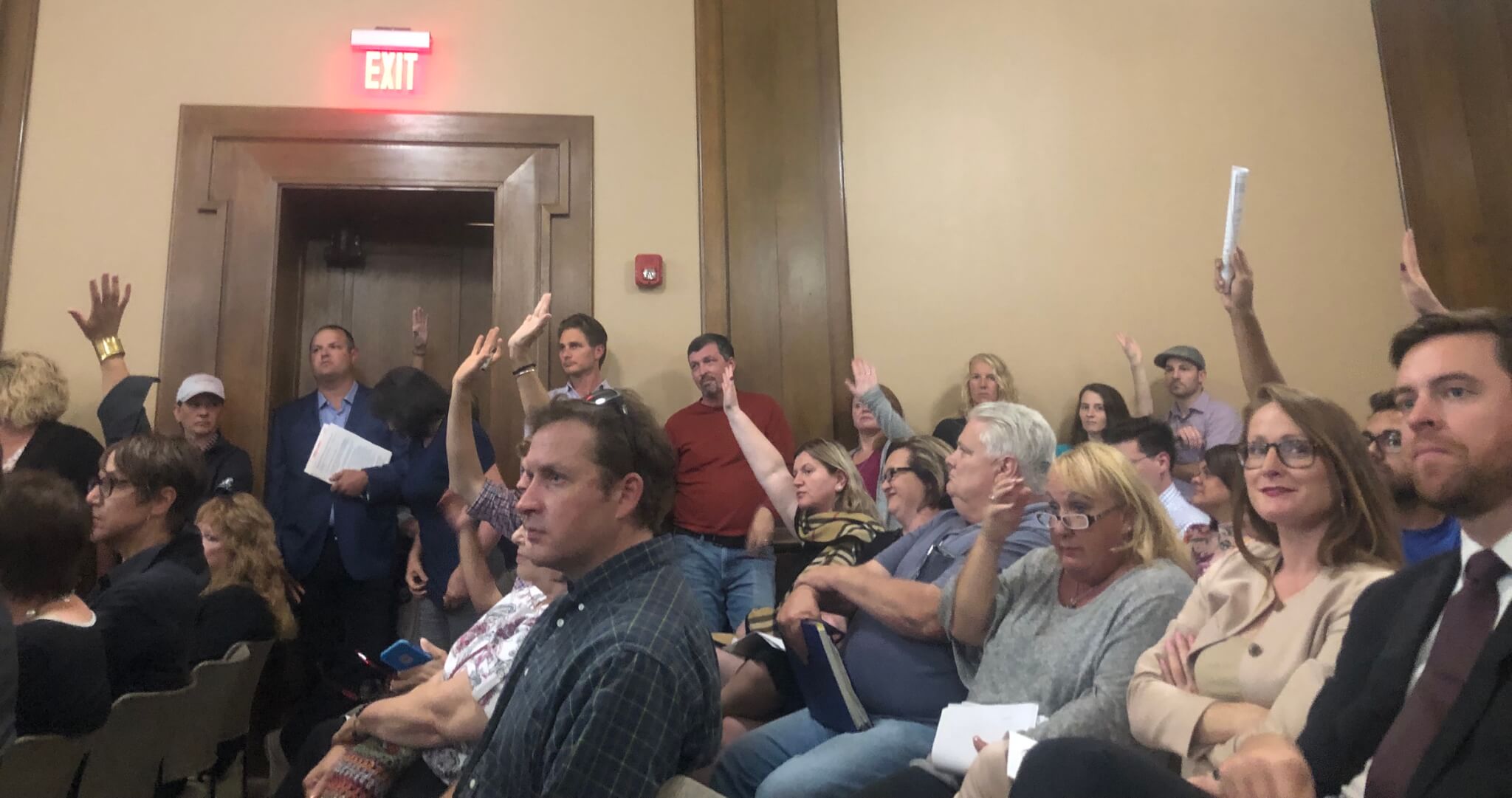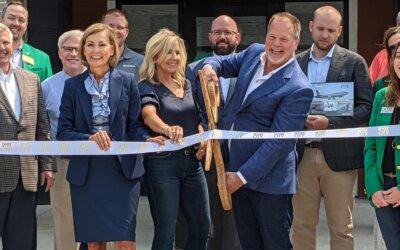
A new Des Moines zoning code was pushed forward by the city council despite pleas by local developers and housing advocates to make the changes more flexible for lower-cost building.
Council chambers overflowed Monday evening as its members unanimously approved the first of three readings on the first code overhaul in 54 years, after over four hours of public hearing.
Controversy surrounds the proposed code’s minimum square footage requirements and other design standards. Some city officials and neighborhood associations are pushing for better quality and more variation in the city’s homes, though critics say the the plan will add further costs to building — reducing affordability in the area amid a shortage of single-family homes.
“Twenty years ago we came here as refugees. About 17 years ago, my family was able to purchase a home through Habitat for Humanity,” said Greater Des Moines Habitat for Humanity board member Suzana Dobrosavljevic to the council. “I’m not 100 percent sure that you understand the impact that the code has on what we build and what we are trying to accomplish.”
Under the new code, new homes will have to be at least 1,100 to 1,800-square-feet, depending on where it’s built in the city and how many stories the home is. It would also include basement and garage requirements, among other design standards.
“It doesn’t mean that anybody is ruling out a house type or in any way restricting affordability, but we certainly want to have quality being one of the underlying pieces of purchases one would make today,” Mayor Frank Cownie said.
[inline-ad id=”0″]
The additional requirements come at a cost. Elisabeth Buck, the president of United Way of Central Iowa said the overall new home construction costs will rise, deterring affordable housing development.
“These restrictions will … make our city less competitive for employers and businesses,” she said.
Greater Des Moines Habitat for Humanity President and Executive Director Lance Henning said the cost of building a house under the new requirements would cost an additional $30,000 to $50,000.
The additional requirements can be exempt, however, if developers do not use a newly proposed fast track approval— meant to avoid traditional Planning and Zoning Commission and Council approval, a notoriously inconvenient process in the city.
The new fast track approval process will make development easier, District 3 Councilmember Josh Mandelbaum said, so the attached minimum requirements will cause the building of affordable options to lag behind that of market value.
“They talk about [the code] like we’ll get our exemptions, but the reality is, they aren’t going to be handing those out all the time,” Henning said. “We’re really unsure. Us, and other developers, would rather plan and invest with certainty.”
Rick Madden, a co-owner of Madden Construction, said he’d have to move development out of the city if the changes are approved.
“We know that if these minimums pass at anything over 1,000 square feet, without a fast pass, Madden Construction will have to join the list of builders leaving Des Moines and focus all our efforts to build in other communities,” he said. “This is a business decision we do not want to make. We want to be in Des Moines.”
But Mel Pins, president of the Somerset Neighborhood Association and a zoning board member, said the new code would urge bigger developments, which would allow for growing families.
He said he and his friends bought property in Des Moines at the start of their professional careers, though most have now moved out of the city.
“We did not offer the housing stock where you could have quality new construction and raise a family with room to grow,” Pins said. “We weren’t doing enough to give people the kind of houses they wanted.”
The zoning comes amid growing affordable housing needs in the city. More than 50 percent of the demand for owner-occupied homes is for homes priced below $175,000, according to data collected by Capital Crossroads, a group that looks at regional issues affecting central Iowa.
“Thirty-three percent of central Iowans are making below of federal poverty level,” poverty reduction initiative, opportUNITY’s, Director Seth Johnson said. “We’re building a lot of market-rate units right now. We’re not building those units that are below market rate, which would be those affordable units for 33 percent of our population.”
by Isabella Murray
Posted 9/10/19

Opinion: Johnson Co. supervisor: We’re still committed to affordable housing
This column, by Johnson County Supervisor Jon Green, is in response to a previous column by leaders from Escucha Mi Voz. On March 3, the Johnson...

Opinion: Johnson County wrong to halt affordable housing project
The following is an open letter from Escucha Mi Voz leaders to the Johnson County Board of Supervisors. Read a Johnson County supervisor's response...

Iowa City mobile home residents protest skyrocketing rent
When Judy McKillip and her husband neared retirement 24 years ago, they bought a mobile home in Iowa City's Modern Manor and found a close-knit...

Veterans Have Until Aug. 9 to Apply for Backdated PACT Act Disability Payments
It's been nearly a year since President Joe Biden signed the PACT Act into law, expanding access to health care and disability compensation for...

Biden Administration Announces $3.1 Billion in Funding to Tackle Homelessness, With Focus on Veterans
The Biden administration on Thursday announced $3.1 billion in federal funding to support efforts to quickly rehouse Americans experiencing...

Skyscrapers in Iowa: Here Are Our 10 Tallest Buildings
Iowa doesn't have the tallest buildings in the world (or country, or region), but we do have a few skyscrapers. Most are in Des Moines, Iowa's...



